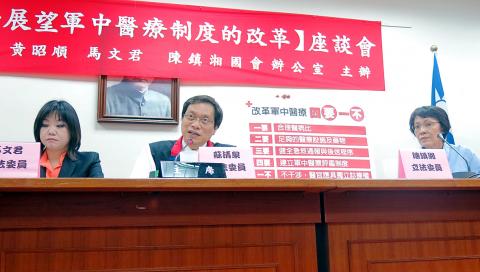The death of army corporal Hung Chung-chiu (洪仲丘) has raised doubts about the preparedness and management of the military’s medical service for both daily health care and emergencies.
Chinese Nationalist Party (KMT) Legislator Su Ching-chuan (蘇清泉), who is also director-general of the Taiwan Medical Association, told a symposium in Taipei on reform in the military medical system that Hung’s case showed the Ministry of National Defense’s Medical Affairs Bureau was guilty of mismanagement.
Guards were not adequately trained for medical issues, there was a lack of emergency equipment in the detention center and ambulances on call did not use their sirens, he said. Information from former medical officials showed there were more problems with the system, Su said.

Photo: CNA
“Bureau Director-General Chang Deh-ming (張德明) said that the doctor-patient ratio in the military, at 1:504, is similar to the national ratio of 1:594 and so could be considered reasonable,” he said. “However, medical officers, military nurses and medical corpsmen are often sent on errands unrelated to their profession. Servicemen released for medical reasons asked to change to civilian clothes before seeking medical treatment to avoid attention and mass infections are not reported for fear of punishment.”
Association secretary-general Tsai Ming-chung (蔡明忠) said the emergency procedures followed by the medical officer, surnamed Lu (呂), who attended Hung — which require a patient to be referred to hospital immediately if the site is poorly equipped — were appropriate.
Chiang Shih-chung (蔣世中), the association’s vice secretary-general, agreed and said the military was being intentionally misleading. Whether oxygen was administered to Hung in the ambulance or the ambulance’s siren was used were clues in resolving Hung’s case, Chiang said.
“The cause of Hung’s death has never been made clear. Was heat stroke and, if so, what caused the heat stroke,” Chiang said.
“We have to make sure that military physicians, who not permitted to join unions and thereby not protected, are guaranteed just and fair treatment,” he added.
Su also voiced concern about the impact the move toward all all-volunteer military will have on the number of doctors in the military.
He said that of the 388 medical officers currently serving in the military (not including those in military hospitals), 236 were serving their mandatory military service.
“As a system of voluntary military service is to be implemented in 2015, a shortage of medical personnel is expected. The military needs to come up with countermeasures to solve this problem,” Su said.
This story has been amended since it was first published.

Taiwan has received more than US$70 million in royalties as of the end of last year from developing the F-16V jet as countries worldwide purchase or upgrade to this popular model, government and military officials said on Saturday. Taiwan funded the development of the F-16V jet and ended up the sole investor as other countries withdrew from the program. Now the F-16V is increasingly popular and countries must pay Taiwan a percentage in royalties when they purchase new F-16V aircraft or upgrade older F-16 models. The next five years are expected to be the peak for these royalties, with Taiwan potentially earning

STAY IN YOUR LANE: As the US and Israel attack Iran, the ministry has warned China not to overstep by including Taiwanese citizens in its evacuation orders The Ministry of Foreign Affairs (MOFA) yesterday rebuked a statement by China’s embassy in Israel that it would evacuate Taiwanese holders of Chinese travel documents from Israel amid the latter’s escalating conflict with Iran. Tensions have risen across the Middle East in the wake of US and Israeli airstrikes on Iran beginning Saturday. China subsequently issued an evacuation notice for its citizens. In a news release, the Chinese embassy in Israel said holders of “Taiwan compatriot permits (台胞證)” issued to Taiwanese nationals by Chinese authorities for travel to China — could register for evacuation to Egypt. In Taipei, the ministry yesterday said Taiwan

‘LIKE-MINDED PARTNER’: Tako van Popta said it would be inappropriate to delay signing the deal with Taiwan because of China, adding he would promote the issue Canadian senators have stressed Taiwan’s importance for international trade and expressed enthusiasm for ensuring the Taiwan-Canada trade cooperation framework agreement is implemented this year. Representative to Canada Harry Tseng (曾厚仁) in an interview with the Central News Agency (CNA) said he was increasingly uneasy about Ottawa’s delays in signing the agreement, especially as Ottawa has warmed toward Beijing. There are “no negotiations left. Not only [is it] initialed, we have three versions of the text ready: English, French and Mandarin,” Tseng said. “That tells you how close we are to the final signature.” Tseng said that he hoped Canadian Prime Minister Mark Carney

POSITIVE DEVELOPMENT: Japan and the US are expected to hold in-depth discussions on Taiwan-related issues during the meeting next month, Japanese sources said The holding of a Japan-US leaders’ meeting ahead of US President Donald Trump’s visit to China is positive news for Taiwan, former Japan-Taiwan Exchange Association representative Hiroyasu Izumi said yesterday. After the Liberal Democratic Party’s landslide victory in Japan’s House of Representatives election, Japanese Prime Minister Sanae Takaichi is scheduled to visit the US next month, where she is to meet with Trump ahead of the US president’s planned visit to China from March 31 to April 2 for a meeting with Chinese President Xi Jinping (習近平). Japan and the US are expected to hold in-depth discussions on Taiwan-related issues during the